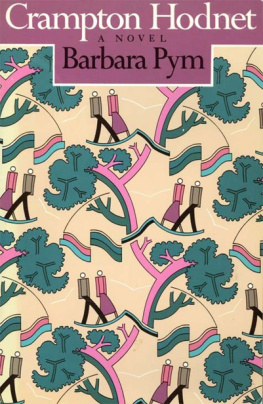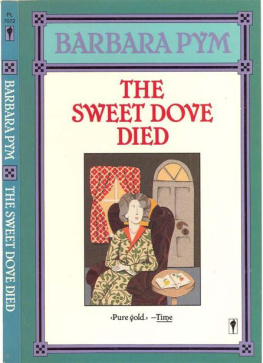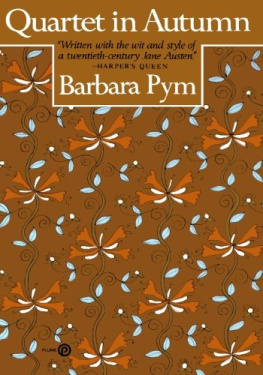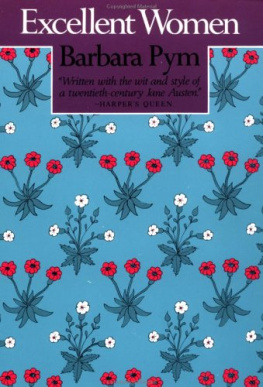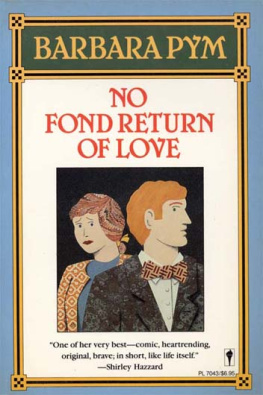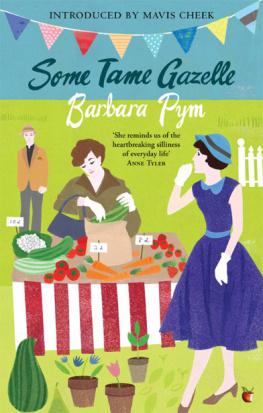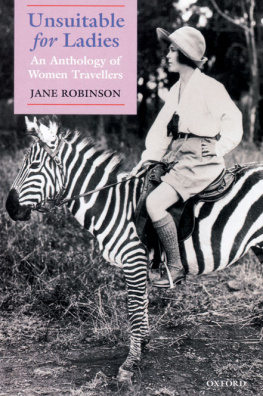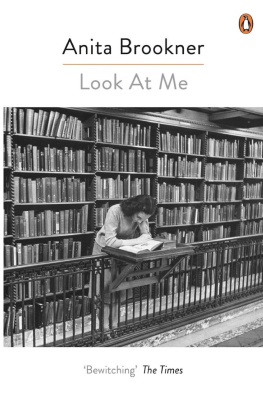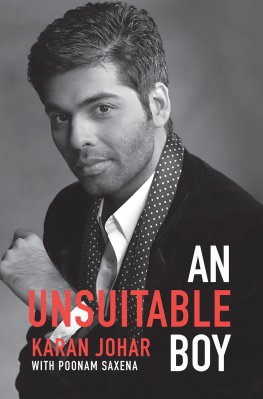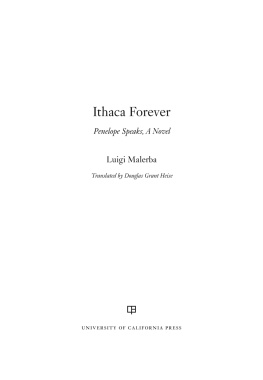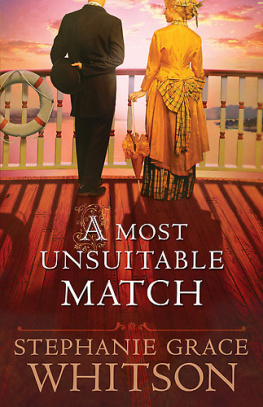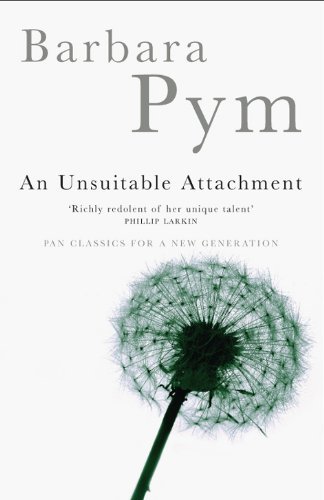
BARBARA PYM
An Unsuitable Attachment
Written 1963, first published 1982
Contents
Foreword
by
Philip Larkin
'I sent my novel to Cape last week,' Barbara Pym wrote to me in February 1963. 'It is called (at present) An Unsuitable Attachment.'' It was her seventh, 'which seems a significant number'. The significance was to prove greater than she could have ever imagined.
Barbara Pym was then in her fiftieth year. Her previous books had been well received by reviewers, and she had gained a following among library borrowers; it was time for a breakthrough that would establish her among the dozen or so novelists recognized as original voices and whose books automatically head the review lists. With this in mind, I had written to her in 1961 saying how much I liked her novels and suggesting I should do an article about them to coincide with the publication of her next, hinting that she should let me know when it was ready. She replied amiably, but was clearly in no hurry, and our correspondence lapsed; the letter I have quoted was the first for over a year.
She did not write again until May, and then, after a courteous page of generalities, it was to say that An Unsuitable Attachment had been rejected. Although she strove to maintain the innocent irony that characterized all her letters, for once it broke down: 'I write this calmly enough, but really I was and am very upset about it and think they have treated me very badly.'
Of course it may be that this book is much worse than my others, though they didn't say so, giving their reason for rejecting it as their fear that with the present cost of book production etc etc they doubted whether they could sell enough copies to make a profit.
To have one's seventh book turned down by a publisher who has seemed perfectly happy with the previous six is a peculiarly wounding experience, and she felt it as such. It is also damaging: another publisher can be approached only from a position of weakness, weaker than if the novel were one's first. A second publisher sent it back saying 'Novels like An Unsuitable Attachment, despite their qualities, are getting increasingly difficult to sell', while a third simply regretted it was not suitable for their list.
What was to be done? I wanted to try it on my own publisher, but Barbara demurred: she wanted to put it aside, to rewrite it, to write something else, and several years went by in which she did all these things, but to no avail. The new book, The Sweet Dove Died, was rejected as firmly as its predecessor, and the revised Attachment was unsuccessfully sent to a second round of publishers, including my own. I wish I had gone ahead and written my article; the honour of publishing the first independent appreciation of her work went instead to Robert Smith, whose 'How Pleasant to Know Miss Pym' appeared in Ariel in October 1971.
It was a strange and depressing time strange, because (as Mr Smith's article indicates) her books retained their popularity. No Fond Return of Love was serialized by the BBC in 1965, while Portway Reprints, that infallible index of what people want to read instead of what they ought to want to read, reissued five others. Depressing, because the wall of indifference she had run up against seemed as immovable as it was inexplicable. For over ten years she had been a novelist: now, suddenly, she was not. The situation was galling. 'It ought to be enough for anybody to be the Assistant Editor of Africa [which is what she was], especially when the Editor is away lecturing for six months at Harvard,' she wrote, 'but I find it isn't quite.'
In 1971 she had a serious operation, and in 1973 retired to live with her sister near Oxford. There her disappointed silence might have ended, but for an extraordinary accident. 'In ten years' time, perhaps someone will be kind enough to discover me,' she had written at the end of 1967, and this was precisely what happened. In 1977 the Times Literary Supplement published a symposium on the most over- and underrated writers of the century, and two contributors named her as the second the only living writer to be so distinguished. The rest is, as they say, history. Her next novel, Quartet in Autumn, was published before the year was out, followed by The Sweet Dove Died. Cape began to reissue her earlier books, Penguin and Granada planned a series of paperbacks. She was widely interviewed, and appeared on 'Desert Island Discs' and in a TV film called 'Tea With Miss Pym'. All this she sustained with unassuming pleasure, but the irony of the situation was not lost on her.
An Unsuitable Attachment, now that it is finally before us, clearly belongs to Barbara Pym's first and principal group of novels by reason of its undiminished high spirits. For although the technique and properties of her last books were much the same, there was a sombreness about them indicative of the changes that had come to her and her world in fifteen years' enforced silence. Here the old confidence is restored: 'Rock salmon that had a noble sound about it,' reflects the vicar, Mark, at the fish and chip shop, buying supper for his wife Sophia and their cat Faustina, and the reader is back among self-service lunches and parish bazaars and the innumerable tiny absurdities to be found there. It is perhaps the most solidly 'churchy' of her books: Mark and Sophia in their North London vicarage are at its centre, and the Christian year Harvest Thanksgiving, Advent, Christmas, Lent and Easter provide both its frame and background. 'One never knew who might turn up in a church on Sunday,' Sophia thinks, and it is this kind of adventitious encounter that once again sets her narrative moving.
The book's chief failing is that the 'unsuitable attachment' between Ianthe Broome, the well-bred librarian with ladylike stockings and brown court shoes, and the younger John Challow, whose own shoes 'seemed to be a little too pointed not quite what men one knew would wear', is not sufficiently central to the story and not fully 'done', as Henry James would say. Potentially the situation is full of interest: John's soppy, rather common, advances, coupled with his borrowing money from her, seemed faintly threatening ('John had been intended to be much worse,' Barbara wrote apologetically), and their relation at one time seems poised for disaster. When this does not happen, its 'unsuitability' becomes rather academic, something felt more by the other characters than Ianthe herself, who 'lets love sweep over, her like a kind of illness' rather than agonize over differences of age and class.
Then again, it is a somewhat self-indulgent book, full of echoes. Sophia and her sister Penelope recall Jane and Prudence, or even Dulcie and Viola from No Fond Return of Love, Sister Dew resembles Sister Blatt from Excellent Women; but other parallels are more explicit. Barbara Pym was always given to reintroducing characters she had used before, and sometimes this is fully justified (the conversation between Wilmet and Rowena in A Glass of Blessings about Rocky Napier is only fully meaningful if we have met him in Excellent Women), but the concluding chapters of An Unsuitable Attachment are a real omnium gatherum-. Esther Clovis and Digby Fox from Less Than Angels, Everard Bone from Excellent Women, Wilf Bason from A Glass of Blessings, and perhaps most extravagantly of all an older but otherwise unchanged Harriet Bede (complete with curate) from Some Tame Gazelle. It is all rather like the finale of a musical comedy.
Next page

